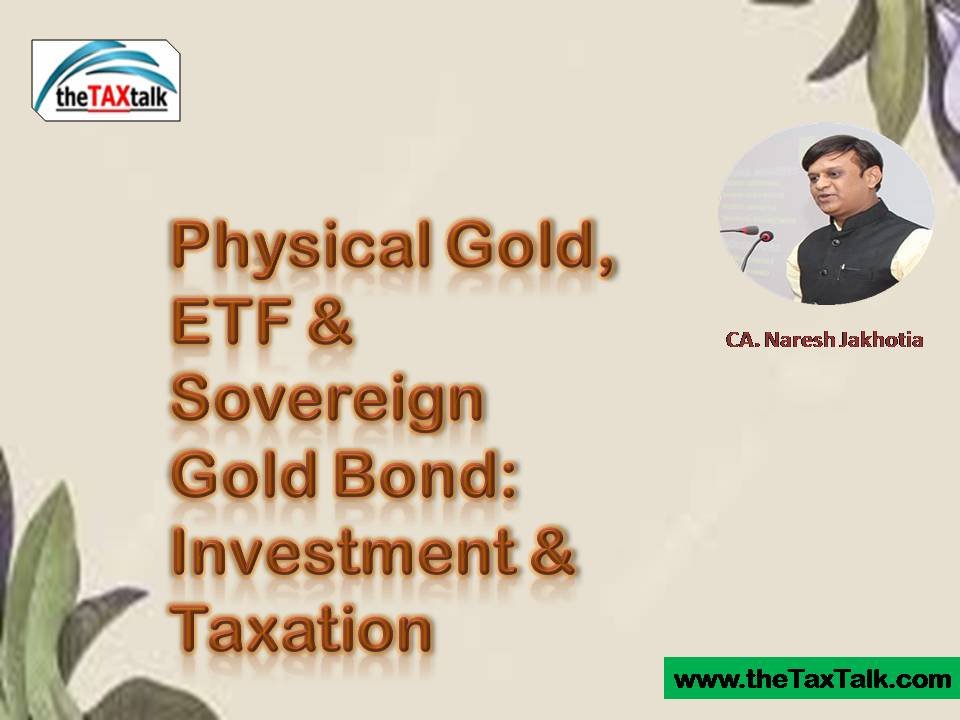![]()
Physical Gold, ETF & Sovereign Gold Bond: Investment & Taxation
Where gold speaks every tongue is silent- Proverb
Though stock market investment has outperformed gold in the last one year, still gold is one of the most preferred investment choices of the Indians.
Gold is considered as a strong hedge against inflation and volatility. At the same time, it has also given a return of around 13% in the last one year. Investment in gold is not only for the purpose of usage but also for the sake of investment. Few years back, physical holding was the only option for investment in Gold. Now, there are other options for investment like Gold Electronic Traded Fund (ETF) & Gold sovereign Bonds (GSB). Interestingly, all above investment options carried different tax impacts & have their own advantages & disadvantages. Let us have a look at it:
Physical Gold:
- a)Advantage and Disadvantage:
It always carries the risk of storage and theft. Purity is also often an issue while purchasing and selling. In addition to this, purchase and sale is a little more expensive as compared to other options. The GST component makes it costlier by 3%. Buying & selling has to be in offline mode only. If anyone wishes to use the gold as an ornament then this is the only option.
- b)Taxation:
Profit arising on sale of physical gold is taxable under the head “Income from Capital Gain” except in case of persons who are into the business of jewellery where it may be taxable as Business income. If gold is sold after a holding period of more than 36 months then profit on sale of it is treated as Long Term Capital Gain (LTCG), else it will be considered as short term (STCG). Indexation benefit is also available to gold with a holding period of more than 36 months meaning thereby that the cost of acquisition would be enhanced to compensate for inflationary effect. In case the gold is not purchased by the taxpayer but the same is inherited (or is received by way of gift) then the cost & date of the previous owner is to be considered in the hands of the recipient for computing capital gain. If the gold is purchased on or before 01.04.2001, then the rate as on 01.04.2001 can be adopted for computing Capital gain. LTCG is taxable @ 20% plus applicable surcharge and education cess.
Gold ETF:
- a)Advantage and Disadvantage:
Gold ETFs score well over physical gold due to convenience of storage and disposal, even though such convenience may entail a small cost in terms of small charges. It is considered as a more secured & returns oriented investment as it is theft free & has easy liquidity. Investment & holding is possible in online mode. Issue of purity and GST is not there in case of investment in Gold ETF. However, minor Brokerage & fund management charges are applicable while buying & selling Gold ETF. Investors don’t have direct demarcated holding of gold but they hold units of gold. There is no fixed return in Gold ETF. - b)Taxation:
Units of Gold ETFs (Electronic Traded Fund) are treated like ‘Debt funds” of mutual funds & taxed accordingly. As Gold ETF are not equity oriented mutual funds, LTCG on the sale of gold ETF’s is not subject to concessional rate of tax of 10%. For the same reason, STCG would be taxed at a normal rate & not at a special rate of taxation of 15% applicable on sale of shares through a recognized stock exchange.
The holding period & tax rate for gold ETF are similar to that of physical gold as discussed above i.e., holding period for an ETF to qualify as long term is a period of more than 36 months and the tax rate applicable would be 20%. Indexation benefit is available if held for a period of more than 36 months.
Gold Sovereign Bond Scheme:
Sovereign Gold Bonds (SGB) is a unique Government security which is denominated in grams of gold.
- a)Advantage and Disadvantage:
Physical Gold & Gold ETF are considered as passive investment as it offers only an opportunity of price rise as against investment in Gold Sovereign Bond which offers fixed interest income too (though at nominal rate). It is a nice substitute for holding physical gold & Gold ETF as it offers regular fixed interest income on investment. Though it is traded on the stock exchange, the trading volume is low. GSB has a fixed maturity tenure of 8 years, with an exit option available after the fifth year on the interest payment dates. These 8 years long tenure may not be suitable for investors who prefer short-term investments or require liquidity.Investment option is open only when the new issue is announced by the Government. Full tax exemption for appreciation in value is available only if one invests in Gold Sovereign bonds. - b)Taxation:
It is the best & most tax efficient investment from the taxation perspective. Capital gains arising on such bonds shall be fully exempt on maturity. However, the profits made on sale of such bonds before the redemption date shall be taxable depending on the holding period which is similar to what is discussed hereinabove. Selling SGB before maturity can attract capital gains tax though it will be the profit element only (after indexation if long term in nature).
The interest on sovereign gold bonds is offered on a half yearly basis & is fully taxable as “Income from other source”. There is no Tax Deducted at Source (TDS) applicable on SGB.
Conclusion:
Gold is considered a profitable investment & global currency which works when all else fails. It is the best protection against inflation and represents the least risk of capital loss. The fact remains –
“Gold is money. Everything else is credit”

